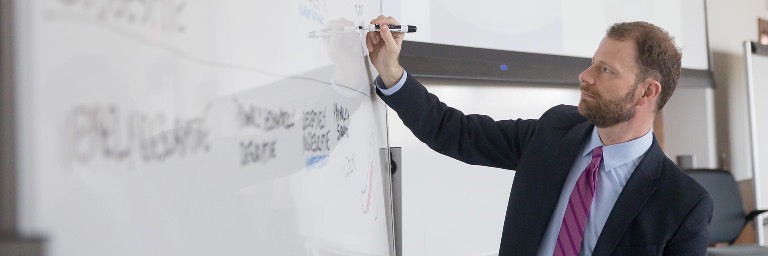Political Science Minor
Gain keen insights into the world of politics.
Understand the social and economic forces that affect governments around the world with a minor in Political Science.
- Program type:
- Minor
- Format:
- On Campus
- Est. time to complete:
- 1-2 years
- Credit hours:
- 18
Why minor in Political Science?
When you study political science, you gain keen insights into the social and economic forces that affect governments around the world. You'll take classes in public policy, international relations, comparative politics and similar topics, while rounding out your education with a spectrum of liberal arts courses that foster critical and independent thinking. The curriculum is flexible, allowing you to tailor your education to match your career goals. Depending on the electives you take, you can focus on pre-law, international relations, political activism or public policy.
With an emphasis on hands-on learning, UND students are encouraged to take internships — in the past, our students have worked with the North Dakota and Minnesota Congressional delegations, government agencies, law firms and judges.
What majors pair well with a Political Science minor?
Combining a Political Science minor with certain majors can enrich your understanding of political systems and broaden your career opportunities in various fields. Alternatively, pursuing a bachelor's degree in Political Science or Pre-Law program can provide a strong foundation for roles in government, public policy, and advocacy. Here are some bachelor's degrees that complement a Political Science minor:
- Social Science Degree: A minor in Political Science complements a Social Science degree by offering a deeper understanding of governmental systems, political behavior, and public policies that shape societies worldwide. This combination equips students with a comprehensive view of the socio-political dynamics and prepares them for impactful careers in public service, advocacy, and global affairs.
- Global Studies Degree: Global studies offer insights into international relations, geopolitics, and global governance, complementing your understanding of political systems at the national and international levels. It provides perspectives on global issues, cross-cultural communication, and diplomacy, which are relevant for careers in diplomacy, international organizations, and global policy analysis.
- Economics Degree: Economics is closely intertwined with political science, particularly in areas such as public policy, economic development, and international trade. A degree in Economics enhances your analytical skills and understanding of economic principles, which are valuable for assessing policy implications and making informed decisions in political contexts.
- History Degree: History provides context for understanding political developments, institutions, and ideologies over time. It offers insights into historical events, social movements, and political philosophies, enriching your understanding of contemporary political issues and dynamics. A History degree complements a Political Science minor by fostering critical thinking and research skills essential for analyzing political phenomena.
- Journalism Degree: Journalism equips you with skills in research, writing, and communication, essential for informing the public and holding political institutions accountable. It provides training in media ethics, news reporting, and investigative journalism, which are valuable for careers in political journalism, public relations, and media analysis.
- Communication Degree: Communication studies offer insights into the role of communication in shaping public opinion, political discourse, and policymaking processes. It focuses on interpersonal communication, mass media, and rhetoric, providing skills in persuasion, negotiation, and strategic communication relevant for political advocacy, campaigns, and public affairs.
